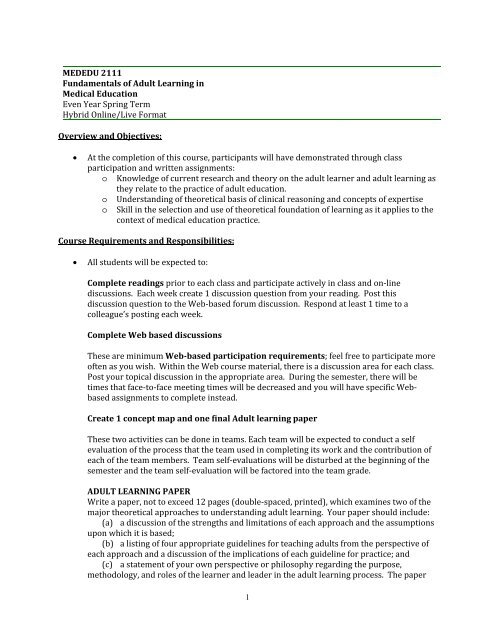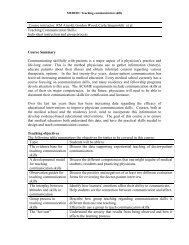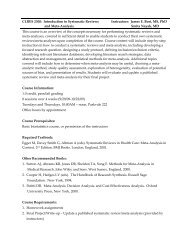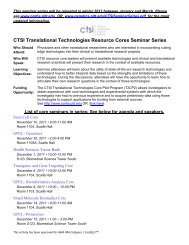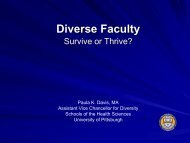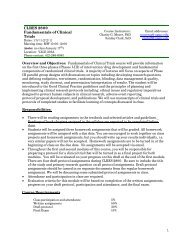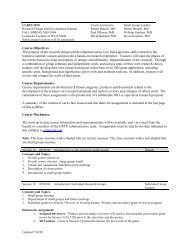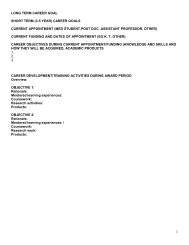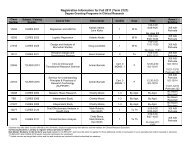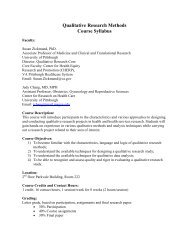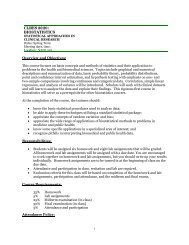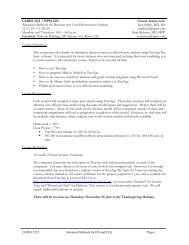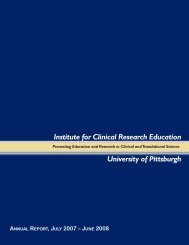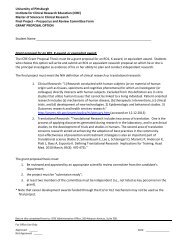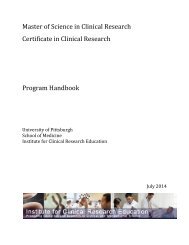here - Institute for Clinical Research Education
here - Institute for Clinical Research Education
here - Institute for Clinical Research Education
You also want an ePaper? Increase the reach of your titles
YUMPU automatically turns print PDFs into web optimized ePapers that Google loves.
MEDEDU 2111Fundamentals of Adult Learning inMedical <strong>Education</strong>Even Year Spring TermHybrid Online/Live FormatOverview and Objectives:At the completion of this course, participants will have demonstrated through classparticipation and written assignments:o Knowledge of current research and theory on the adult learner and adult learning asthey relate to the practice of adult education.o Understanding of theoretical basis of clinical reasoning and concepts of expertiseo Skill in the selection and use of theoretical foundation of learning as it applies to thecontext of medical education practice.Course Requirements and Responsibilities:All students will be expected to:Complete readings prior to each class and participate actively in class and on‐linediscussions. Each week create 1 discussion question from your reading. Post thisdiscussion question to the Web‐based <strong>for</strong>um discussion. Respond at least 1 time to acolleague’s posting each week.Complete Web based discussionsThese are minimum Web‐based participation requirements; feel free to participate moreoften as you wish. Within the Web course material, t<strong>here</strong> is a discussion area <strong>for</strong> each class.Post your topical discussion in the appropriate area. During the semester, t<strong>here</strong> will betimes that face‐to‐face meeting times will be decreased and you will have specific Webbasedassignments to complete instead.Create 1 concept map and one final Adult learning paperThese two activities can be done in teams. Each team will be expected to conduct a selfevaluation of the process that the team used in completing its work and the contribution ofeach of the team members. Team self‐evaluations will be disturbed at the beginning of thesemester and the team self‐evaluation will be factored into the team grade.ADULT LEARNING PAPERWrite a paper, not to exceed 12 pages (double‐spaced, printed), which examines two of themajor theoretical approaches to understanding adult learning. Your paper should include:(a) a discussion of the strengths and limitations of each approach and the assumptionsupon which it is based;(b) a listing of four appropriate guidelines <strong>for</strong> teaching adults from the perspective ofeach approach and a discussion of the implications of each guideline <strong>for</strong> practice; and(c) a statement of your own perspective or philosophy regarding the purpose,methodology, and roles of the learner and leader in the adult learning process. The paper1
should be based primarily on the text and preparatory readings from this course. Makesure to include at least 5 other citations of course readings, besides your textbook.Attendance Policy:Attendance is expected <strong>for</strong> each class session. Emergencies are the only acceptable excuse<strong>for</strong> missing class and in that case you must contact the instructors so we can makearrangements <strong>for</strong> you to make up the work you will miss.Students are expected to sign‐in to each class (computer provided in suite lobby). If aproblem is encountered with the sign‐in system, please contact the course instructor(s) aswell as Lauren Talotta (talottals@upmc.edu) immediately.Course Grading Scale:Normal graduate course grading will be used, with A indicating strong per<strong>for</strong>mance and Bindicating clearly acceptable per<strong>for</strong>mance.Required Textbook(s):Merriam, S. B., Caffarella, R. S., & Baumgartner, L. (2006). Learning in adulthood (3 rd ed.).San Francisco: Jossey‐Bass.Brans<strong>for</strong>d, John, Brown, Ann L., & Cocking, Rodney R. (Eds.). (1999). How People Learn:Brain, Mind, Experience, and School. Washington, D.C.: National Academy Press. Available <strong>for</strong>free online at http://www.nap.edu/openbook.php?isbn=0309070368Website resources:You will need concept mapping software. We recommend the program called CMAP, whichis available <strong>for</strong> free from cmap.ihmc.us/downloadAcademic Integrity:Students in this course will be expected to comply with the University of Pittsburgh's Policy onAcademic Integrity (http://www.provost.pitt.edu/info/ai1.html). Any student suspected ofviolating this obligation <strong>for</strong> any reason during the semester will be required to participate in theprocedural process, initiated at the instructor level, as outlined in the University Guidelines onAcademic Integrity. This may include, but is not limited to, the confiscation of the examination ofany individual suspected of violating University Policy. Furthermore, no student may bring anyunauthorized materials to an exam, including dictionaries and programmable calculators. In teamassignments, it is expected that all team members will participate substantially. In all assignments,it is expected that any work of others will be appropriately cited.2
Course ScheduleSession 1: Course IntroductionAt the conclusion of this session, the student will:Topics:1. Have a sense of the overall landscape of research that supports optimal learning andteaching.2. Understand how the course will operate and what tasks are required.Dyads: Introduction of ParticipantsLecture/Discussion:Introduction to the SyllabusIntroduction to media resourcesRequired Reading(s):1. Novak, J., & Gowin, B. (1984). Learning how to learn. Cambridge University Press.Chapters 1 and 2.Session 2: Context and Analysis of Learning OpportunitiesAt the conclusion of this session, the student will be able to:1. Understand the needs of adult learners and begin to understand how best to teach them.Topics:Who is the Adult Learner? What is Adult <strong>Education</strong>?Required Reading(s):1. Merriam, S. B., Caffarella, R. S., & Baumgartner, L. M. (2006). Learning in adulthood (3 rded.). San Francisco: Jossey‐Bass, Chapters 2 &3Sessions 3 & 4: Traditional learning theories: Framework and applications in medicaleducationAt the conclusion of this session, the student will be able to:1. Understand the general principles of what is known about learning and, morespecifically, be aware of the 25 essential principles that support evidence‐basedapproaches to teaching.Topics:1. The basic principles of learning, as derived from laboratory research.3
Required Reading(s):1. For 9/14/2011: Merriam, S. B., Caffarella, R. S., & Baumgartner, L. M. (2006), Chs. 112. For 9/21/2011: Graesser’s 25 principles of learning:http://www.psyc.memphis.edu/learning/whatweknow/index.shtml & National<strong>Research</strong> Council. (2000). How People Learn. Pp. 31‐78.Due <strong>for</strong> each of the two sessions:1. At least one question posted at least a day in advance of each of the two classes abouthow the principles you have been reading about might apply to a specific medicaleducation problem you face.Session 5: Andragogy and Self‐directed LearningAt the conclusion of this lecture, the student will be able to:Topics:1. Make use of the understanding of self‐directed behavior in adult learners1. Self‐directed learningRequired Reading(s):1. Merriam, S. B., Caffarella, R. S., & Baumgartner, L. M. (2006), Chapters 3 & 4 & 52. Garrison, D. R. (1997). Self‐directed learning: Toward a comprehensive model. Adult<strong>Education</strong> Quarterly, 24(1), 18‐33.Session 6: Analysis and Design of Instruction <strong>for</strong> Complex Per<strong>for</strong>mances: concept maps andtask analyses, supporting high‐level learningAt the conclusion of this lecture, the student will be able to:Topics:1. Use a concept mapping tool to clarify the points to be covered in a teaching ef<strong>for</strong>t1. Concept mapping and task analysisRequired Reading(s):1. Read the material available on cmap.ihmc.us2. Reread Graesser’s 25 principles of learning:http://www.psyc.memphis.edu/learning/whatweknow/index.shtml3. Friedlander, M. J., Andrews, L., Armstrong, E. G., Aschenbrenner, C., Kass, J. S., Ogden, P.,Schwartzstein, R., Viggiano, T. R. (2011). What Can Medical <strong>Education</strong> Learn From theNeurobiology of Learning? Academic Medicine. 86(4):415‐4204
Homework assignment(s):Due Today:1. Begin work on your concept map, which should be <strong>for</strong> a real medical education problemyou face.1. At least one day prior to class, post at least one question about how to do conceptmapping <strong>for</strong> a particular small topic.Session 7: Expertise in Problem Solving: basics of expertise, expertise and error, tyingexpertise to the basics of learningAt the conclusion of this lecture, the student will be able to:1. Understand basic principles of expertise2. Have a sense of the potential and the difficulties in deploying new technologies that canteach complex problem solving efficientlyTopics:1. The nature of expertise2. The practical issues in building expertise using intelligent systems technologiesRequired Reading(s):1. Reread Pp. 31‐50 in How People Learn2. Lesgold, A. Practical issues in the deployment of new training technology. In P. J. Durlach,& A. Lesgold (Eds.). (Forthcoming). Adaptive Technologies <strong>for</strong> Training and <strong>Education</strong>. NewYork: Cambridge University Press.Homework assignment(s):1. Using the basic principles and concepts of expertise, be prepared to describe, in class,the expected differences between novices, mid‐level (journeymen), and expertper<strong>for</strong>mances in a medical capability that you are involved in teaching.Session 8: Reflection and TransferAt the conclusion of this lecture, the student will be able to:Topics:1. Recognize the transfer goals <strong>for</strong> any learning activity2. Develop reflection opportunities to promote transfer, as part of learning activities1. The nature of transfer5
2. The role of reflection in promoting transferRequired Reading(s):1. How People Learn, pp. 233‐242.2. Katz, S., & Allbritton, D., & Connelly, J. (2003). Going beyond the problem given: Howhuman tutors use post‐solution discussions to support transfer. International Journal ofArtificial Intelligence and <strong>Education</strong>, 13 (1), 79‐116.3. Mezirow, J. (1998). On critical reflection. Adult <strong>Education</strong> Quarterly, 48(3), 185‐198.4. Taylor, E. W. (2007). An update of trans<strong>for</strong>mative learning theory: A critical review ofthe empirical literature (1999‐2005). International journal of lifelong learning, 26(2),173‐191.Homework assignment(s):1. Be working on the final paper,6


